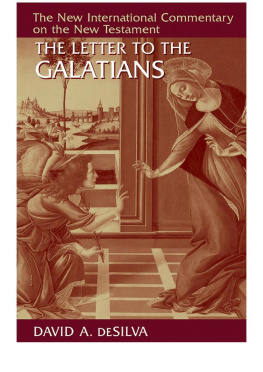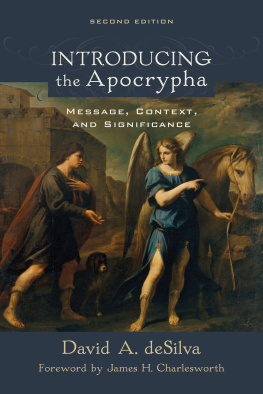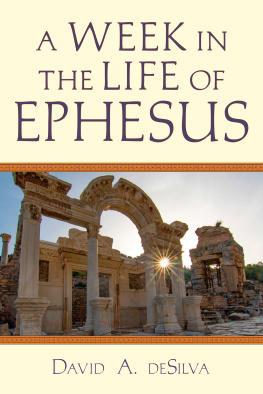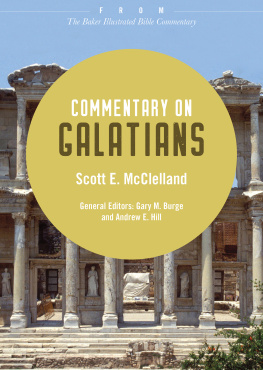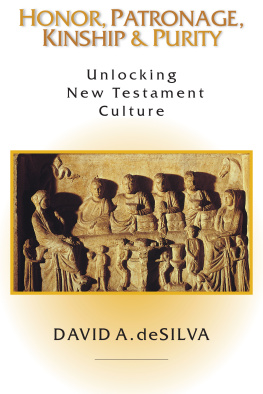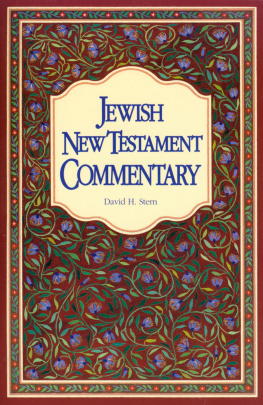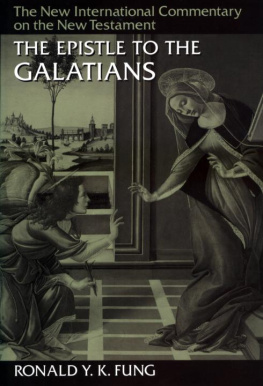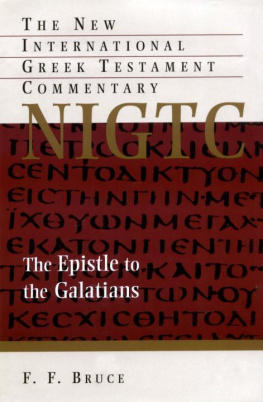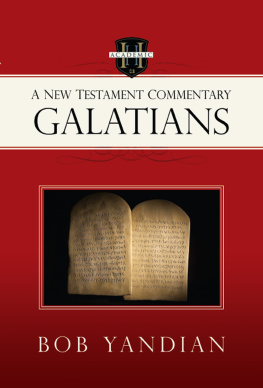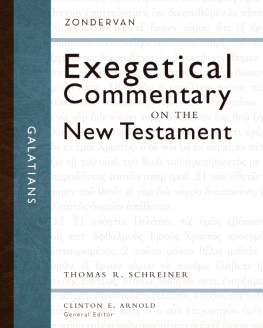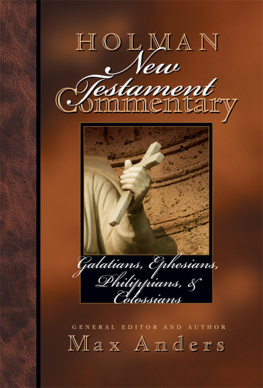David A. deSilva - Galatians (The new international commentary on the New Testament)
Here you can read online David A. deSilva - Galatians (The new international commentary on the New Testament) full text of the book (entire story) in english for free. Download pdf and epub, get meaning, cover and reviews about this ebook. year: 2018, genre: Art. Description of the work, (preface) as well as reviews are available. Best literature library LitArk.com created for fans of good reading and offers a wide selection of genres:
Romance novel
Science fiction
Adventure
Detective
Science
History
Home and family
Prose
Art
Politics
Computer
Non-fiction
Religion
Business
Children
Humor
Choose a favorite category and find really read worthwhile books. Enjoy immersion in the world of imagination, feel the emotions of the characters or learn something new for yourself, make an fascinating discovery.
- Book:Galatians (The new international commentary on the New Testament)
- Author:
- Genre:
- Year:2018
- Rating:5 / 5
- Favourites:Add to favourites
- Your mark:
- 100
- 1
- 2
- 3
- 4
- 5
Galatians (The new international commentary on the New Testament): summary, description and annotation
We offer to read an annotation, description, summary or preface (depends on what the author of the book "Galatians (The new international commentary on the New Testament)" wrote himself). If you haven't found the necessary information about the book — write in the comments, we will try to find it.
David A. deSilva: author's other books
Who wrote Galatians (The new international commentary on the New Testament)? Find out the surname, the name of the author of the book and a list of all author's works by series.
Galatians (The new international commentary on the New Testament) — read online for free the complete book (whole text) full work
Below is the text of the book, divided by pages. System saving the place of the last page read, allows you to conveniently read the book "Galatians (The new international commentary on the New Testament)" online for free, without having to search again every time where you left off. Put a bookmark, and you can go to the page where you finished reading at any time.
Font size:
Interval:
Bookmark:
THE NEW INTERNATIONAL COMMENTARY
ON THE
NEW TESTAMENT
General Editors
NED B. STONEHOUSE
(19461962)
F. F. BRUCE
(19621990)
GORDON D. FEE
(19902012)
JOEL B. GREEN
(2013)
The Letter to the
DAVID A. DESILVA
WILLIAM B. EERDMANS PUBLISHING COMPANY
GRAND RAPIDS, MICHIGAN
Wm. B. Eerdmans Publishing Co.
2140 Oak Industrial Drive NE, Grand Rapids, Michigan 49505
www.eerdmans.com
2018 David A. deSilva
All rights reserved
Published 2018
24 23 22 21 20 19 181 2 3 4 5 6 7
ISBN 978-0-8028-3055-5
eISBN 978-1-4674-5044-7
Library of Congress Cataloging-in-Publication Data
Names: DeSilva, David Arthur, author.
Title: The letter to the Galatians / David A. deSilva.
Description: Grand Rapids : Eerdmans Publishing Co., 2018. | Series: The new international commentary on the New Testament | Includes bibliographical references and index.
Identifiers: LCCN 2017060965 | ISBN 9780802830555 (hardcover : alk. paper)
Subjects: LCSH: Bible. GalatiansCommentaries.
Classification: LCC BS2685.53 .D475 2018 | DDC 227/.4077dc23
LC record available at https://lccn.loc.gov/2017060965s
To Daniel G. Reid
lifelong scholar and facilitator
of scholarship in the service of faith,
with gratitude
A.The Case for Circumcision
B.Torah as the Way to Perfection
C.Whom Should the Galatians Trust?
A.The Data within Galatians
B.Acts and Galatians
C.Was Paul Addressing Churches in North or in South Galatia?
D.Pauls Visits to Jerusalem in Galatians and Acts
A.Galatians as Ancient Letter
B.Pauls Goals for Galatians and Its Rhetorical Genre
C.Appeals to Ethos, Pathos, and Logos in Galatians
D.The Strategic Arrangement of Galatians
A.The Divine Source of Pauls Dramatic Transformation and Gospel (1:1117)
B.Pauls First Visit to Jerusalem and Work in Syria and Cilicia (1:1824)
C.Pauls Second Visit to Jerusalem (2:110)
D.The Confrontation in Antioch (2:1114)
E.The Coherence of Pauls Position (2:1521)
A.Proof from Experience: The Galatians Reception of the Spirit (3:16)
B.Proof from Abrahams Precedent (3:79)
C.Deductive Proof from the Scriptures (3:1014)
D.Proof from Analogy: Testamentary Law (3:1518)
E.Why, Then, the Torah? (3:1922)
F.Proof from Analogy: Coming of Age in the Household, Part 1 (3:2329)
G.Proof from Analogy: Coming of Age in the Household, Part 2 (4:17)
H.Rebuke Based on Argument from Analogy (4:811)
A.Pauls Recommended Course of Action (5:16)
B.A Strategic Resumption of Appeals to Ethos (5:712)
A.The Spirits Sufficiency to Nurture Righteousness (5:1326)
B.Practical Advice for Walking in the Spirit (6:110)
PAUL, RHETORIC, AND LETTER-WRITING IN ANTIQUITY
PAULS ENCOUNTER WITH THE RESURRECTED JESUS AND PAULS PARADIGM SHIFT
JAMES, THE BROTHER OF THE LORD
PRONOUNS, PEOPLE GROUPS, AND THE PLAN OF GOD IN GALATIANS 34
As Acts tells the story, the Lord choreographed an encounter between Philip and an Ethiopian eunuch on the road from Jerusalem to Gaza. This Ethiopian, who had a copy of at least some of the Scriptures, was reading from the prophet Isaiah. Hearing him read, Philip inquired, Are you really grasping the significance of what you are reading? The Ethiopian responded, How can I, unless someone guides me? The result was that Philip shared the good news about Jesus with him, and the Ethiopian was baptized as a new Christ-follower (Acts 8:2640).
It is difficult to imagine a more pressing mandate for the work of a commentary than this: to come alongside readers of Scripture in order to lead them so that they can grasp the significance of what they readand to do so in ways that are not only informative but transformative. This has been and remains the aim of the New International Commentary on the New Testament. The interpretive work on display in this volumeand, indeed, in this commentary seriescan find no better raison dtre and serve no better ambition.
What distinguishes such a commentary?
First and foremost, we are concerned with the text of Scripture. It does not mean that we are not concerned with the history of scholarship and scholarly debate. It means, rather, that we strive to provide a commentary on the text and not on the scholarly debate. It means that the centerpiece of our work is a readable guide for readers of these texts, with references to critical issues and literature, as well as interaction with them, all found in our plentiful footnotes. Nor does it mean that we eschew certain critical methods or require that each contributor follow a certain approach. Rather, we take up whatever methods and pursue whatever approaches assist our work of making plain the significance of these texts.
Second, we self-consciously locate ourselves as Christ-followers who read Scripture in the service of the church and its mission in the world. Reading in the service of the church does not guarantee a particular kind of interpretationsay, one that is supportive of the church in all times and places or that merely parrots what the church wants to say. The history of interpretation demonstrates that, at times, the Scriptures speak a needed prophetic word of challenge, calling the church back to its vocation as the church. And at other times, the Scriptures speak a word of encouragement, reminding the church of its identity as a people who follow a crucified Messiah and serve a God who will vindicate Gods ways and Gods people.
We also recognize that, although the Scriptures are best read and understood through prayerful study and in the context of the churchs worship, our reading of them cannot be separated from the world that the church engages in mission. C. S. Lewis rightly noted that what we see is determined in part by where we are standing, and the world in which we stand presses us with questions that cannot help but inform our interpretive work.
It is not enough to talk about what God once said, for we need to hear again and again what the Spirit, through the Scriptures, is now saying to the church. Accordingly, we inquire into the theological significance of what we read, and into how this message might take root in the lives of Gods people.
Finally, the New International Commentary on the New Testament is written above all for pastors, teachers, and students. That is, our work is located in that place between the more critical commentaries, with their lines of untranslated Greek and Aramaic and Latin, and the homiletical commentaries that seek to work out how a text might speak to congregations. Our hope is that those preparing to teach and preach Gods word will find in these pages the guide they need, and that those learning the work of exegesis will find here an exemplar worth emulating.
JOEL B. GREEN
Writing a commentary on Galatians has been a daunting task. First, there is the mundane cause for apprehensionthe overwhelming amount of secondary literature on Galatians, compounded by the fact that one cannot engage the conversations about Galatians without also delving into the even more overwhelmingly vast secondary literature on Paul. The second and more important challenge is the inherently rich contribution Galatians makes to Christian thought and practice, on the one hand, and on the other, the theological investment that readers bring to Galatians. And the theological issues that Galatians raises, or that are brought to Galatians, are both foundational and legion.
In this commentary I have attempted to give a coherent accounting of Galatians as a piece of strategically crafted communication addressing the immediate pastoral challenge facing Pauls converts in Galatia and the underlying questions that gave rise to the situation in which Paul desperately seeks to intervene. Pauls communication is thoroughly theological, with the result that I have also attempted to give a coherent exposition of the theological argument and underpinnings of Galatians. I do not present these facets of my commentary as a theology of Paul, but simply as a theology of Galatians. Nevertheless, I do present the latter as an indispensable step toward the former.
Next pageFont size:
Interval:
Bookmark:
Similar books «Galatians (The new international commentary on the New Testament)»
Look at similar books to Galatians (The new international commentary on the New Testament). We have selected literature similar in name and meaning in the hope of providing readers with more options to find new, interesting, not yet read works.
Discussion, reviews of the book Galatians (The new international commentary on the New Testament) and just readers' own opinions. Leave your comments, write what you think about the work, its meaning or the main characters. Specify what exactly you liked and what you didn't like, and why you think so.

